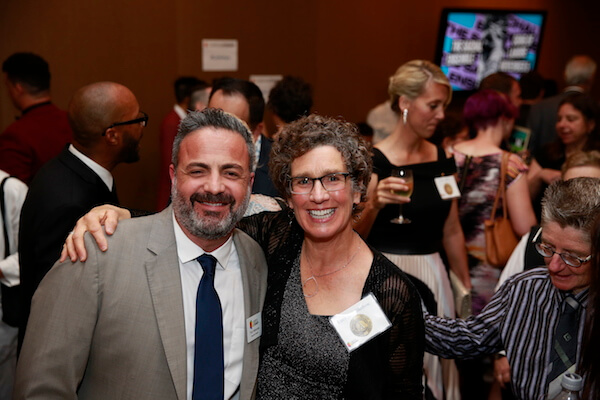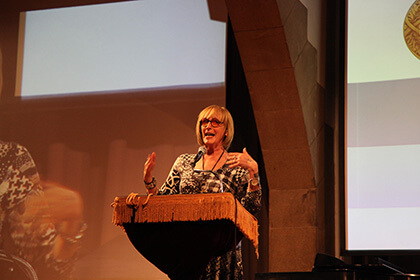Bob Ashe, Mark Merlis’ surviving spouse, at a December 12 evening of readings of the late novelist’s work. | GAY CITY NEWS
In a warm gathering of colleagues, admirers, friends, and family of Mark Merlis, the late novelist was recalled as a writer of “impeccable” “voice, details, and language,” a blunt-spoken but generous mentor, and a “humble person” who — making his living as a health policy expert — shunned attention from his social circle and colleagues for his life as an esteemed author.
Chris Bram, the writer whose large body of fiction and historical work has ranged from novels including “Hold Tight,” “Father of Frankenstein” (adapted for film as “Gods and Monsters”), and “Exiles in America” to his 2016 “The Art of History: Unlocking the Past in Fiction and Nonfiction,” organized the memorial reading as part of the LGBT Community Center’s Second Tuesday Lecture Series on December 12.
Merlis, born in 1950 and raised near Baltimore, died this past August 15 after living for a year with an amyotrophic lateral sclerosis (ALS) diagnosis. His four novels were “American Studies” (1994), which won the New York Publishing Triangle’s Ferro-Grumley Award and the Los Angeles Times’ Art Seidenbaum Award for First Fiction; “An Arrow’s Flight” (1998), which was honored by the Lambda Literary Foundation; “Man About Town” (2003); and “JD” (2015).
Community Center reading of late novelist’s writing warmed an early winter evening
Merlis was living in Philadelphia at the time of his death with his husband of 35 years, Bob Ashe, who was on hand at the reading, along with Mark’s brother Dr. Tony Merlis, his wife Ellen, and their daughters Jennifer and Abigail, and his brother Dan Merlis and his wife Deany.
Chris Bram, a novelist and history writer, organized the evening of readings. | GAY CITY NEWS
Bram opened the evening by admitting that when he first started reading “American Studies” for a Lambda Book Report review he was jealous at the competition.
“He was so good I stopped feeling competitive,” Bram recalled. “He had a great subject: memories of gay love at the time of the Red Scare in the 1950s. The voice, details, and language were impeccable. Under that was a keen sense of structure and story.”
Assessing Merlis’ body of work, Bram said, “He wrote in a deceptively traditional manner, and he made it look easy. Fellow writers were the first to recognize how much skill and knowledge went into his eloquent prose, and how much innovation was taking place under the surface.”
Among the other readers and participants were Patrick Merla, the literary agent and editor who oversaw leading gay publications including Christopher Street, the New York Native, and the James White Review; Scott Heim, the writer, poet, and editor whose novels include “Mysterious Skin,” “In Awe,” and “We Disappear”; Michael Lowenthal, a novelist and short story writer whose most recent books are “Charity Girl” and “The Paternity Test”; Edward Hibbert, the literary agent and actor with many Broadway and West End credits but most widely known for his role as food critic Gil Chesterton on “Frasier”; William Johnson, the program director at the Lambda Literary Foundation; the novelist, poet, and short story writer Paul Russell, a two-time Ferro-Grumley winner, most recently for 2012’s “The Unreal Life of Sergey Nabokov”; and short story writer William Walker, whose debut collection, “Desire: Tales of New Orleans,” was published in 2012.
Heim, whose “Mysterious Skin” was adapted for film by Gregg Araki, recalled reading “American Studies” in galleys at Houghton and later being asked to write a blurb for “a book that was 100 times better than anything I could write.” Lowenthal talked about the honor he felt being asked by Merlis to offer editorial suggestions on “JD,” and Russell also spoke about his relationship with Merlis in trading manuscripts for comment. Johnson praised Merlis’ ability to capture “the beauty and sadness of moving through this world.”
Edward Hibbert reading from Mark Merlis’ “JD” was among the evening’s highlights. | GAY CITY NEWS
Hibbert, who recalled sharing many meals with Merlis at Café Loup in the West Village, read from the ending of “JD,” and his delightful and dramatic British delivery was an evening highlight, but the heart of the experience came in Ashe’s comments about his late husband at the event’s close.
“He believed being a writer was the single greatest calling in life,” Ashe said of Merlis. Explaining why, then, Merlis would get angry if his husband told friends about his literary successes, Ashe said the writer’s answer was, “That’s my piece of me.” Many longtime friends of Merlis’ were shocked at his death to learn he was a writer at all.
During their 35 years together, Ashe recalled, Merlis would rise three or four hours early to write before going to work.
“He started shopping work in 1971 right after college,” Ashe recalled. “Twenty-three or 24 years later, he was published.”
Ashe admitted to some trepidation about traveling to New York for the evening of readings, fearing, “I’m not ready to do that,” that it would be like giving up Merlis. Then, with evident gratitude, he added, “But the readers tonight reminded me he will live on.”


































